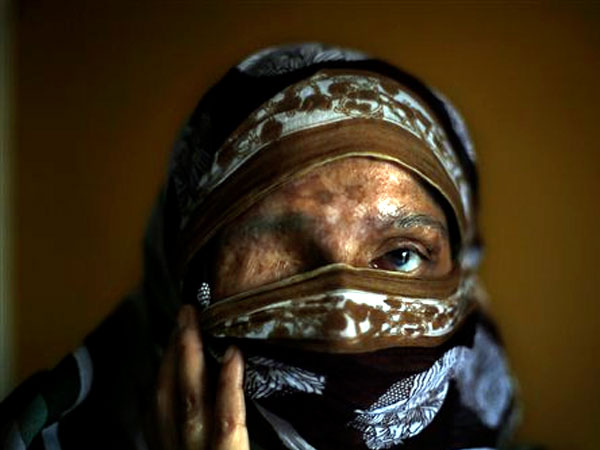Indian acid attack victims say new law is ignored

In this Thursday, Dec. 5, 2013 photo, a 30-year acid attack victim, name withheld on request, looks into the camera as she sits in the office of the Indian NGO Stop Acid Attacks, in New Delhi, India. Victims of acid attacks are pressing the Indian government to do more to prevent such violence, saying a new law aimed at restricting the sale of dangerous is being ignored. Highly concentrated acids are readily available in India for use as household and industrial cleaners. AP
NEW DELHI — A gang of young neighborhood men would harass Sonali Mukherjee whenever she left home — taunting her, following her, hissing lewd comments.
But Mukherjee, 18 at the time, was not afraid. A sociology student, she stood up to her tormenters. After she threatened to go to the police, they sneaked into her house and poured acid on her while she slept, melting away much of her face.
“I did not know that they were hatching a plan to take revenge,” she said, more than 10 years later.
Now, Mukherjee and other victims of acid attacks are pressing the Indian government to do more to prevent such violence, saying a new law aimed at restricting the sale of acid is being ignored.
In response to their campaign, the Indian Supreme Court on Dec. 3 ordered all states to comply with the law, which went into effect in February after a deadly gang rape in New Delhi last year galvanized public anger over violence toward women. It prohibits the sale of acid unless the seller maintains a record of the buyers and orders states to pay acid attack victims $1,400 in compensation.
Article continues after this advertisementThe law is among a wave of changes implemented after the New Delhi rape case, including a provision that called for stiffer prison terms — a minimum of 10 years and up to life imprisonment — and no bail for those who carry out acid attacks.
Article continues after this advertisementHighly concentrated acids are readily available in India for use as household and industrial cleaners. The liquids are often produced locally and are dirt cheap.
Earlier, acid attacks came under a general category of crimes that caused hurt, or grievous hurt, or attempted murder. Indian laws did not take into account the disfiguration of a woman in an acid attack as a separate crime.
Mukherjee’s attackers were freed after serving three years in prison.
Some 1,500 acid attacks are reported worldwide every year, according to the London-based charity Acid Survivors Trust International. The group says the actual figure is likely to be far higher because so many victims are too scared to speak out.
India has no official statistics on the matter, but reports of acid attacks appear regularly in the media. Attackers often target the head and face in order to maim, disfigure and blind their victims, often because of spurned sexual advances.
Laxmi, who volunteers with Mukherjee at the Indian private group Stop Acid Attacks, said Indian law is failing women. Laxmi, 24, who goes by one name, was doused with acid eight years ago after ignoring repeated overtures from a man more than 25 years her senior.
“The one who attacked me, what did he get and what did I get? He got arrested after four days of the attack and was bailed out after a month,” Laxmi said. Now, she says, he is married and has a child.
“Where is justice? Where is the law? Nowhere,” she said.
Kamlesh Jain, a lawyer who represents acid attack victims, says the poor are particularly vulnerable after an attack.
“Even if the case is pursued, the sentence awarded until now is … not sufficient to tackle this problem,” she said.
And the victims’ scars amount to a lifetime sentence for many women.
“I have seen many times when the victim is completely cut off from the society,” said Mukherjee, who has undergone 28 surgeries in 10 years. The attack left her blind and partially deaf.
She said she struggled with her identity for years after the attack, at one point even asking the courts to allow her to commit suicide. Euthanasia is illegal in India and her plea was rejected.
But now, Mukherjee says she is coming to terms with her future, and is bolder about appearing in public and telling her story.
“I have been saying this to myself, ‘Why should I feel ashamed? Why should my family be ashamed? Why should I hide my face? Why should I hide myself in a closed room?'” she said. “When the criminals who did this to me are free, wearing fancy sunglasses and driving around in a car, why should I hide myself in a room?”
RELATED STORIES:
Indian businessman arrested in rape of Irish woman